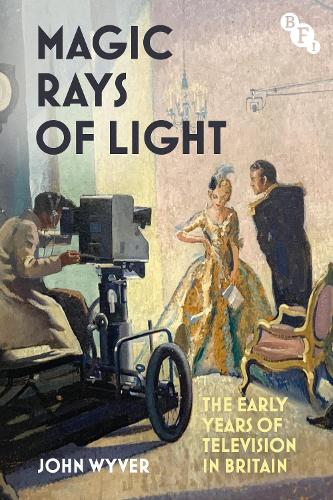
Magic Rays of Light: The Early Years of Television in Britain
(Hardback)
Available Formats
Publishing Details
Magic Rays of Light: The Early Years of Television in Britain
By (Author) John Wyver
Bloomsbury Publishing PLC
BFI Publishing
19th March 2026
United Kingdom
Classifications
Tertiary Education
Non Fiction
Television
Television technology
Physical Properties
Hardback
320
Width 156mm, Height 234mm
Description
Magic Rays of Light is an original and ambitious history of the largely unknown early years of television in Britain. A detailed cultural study of the first demonstrations, of the extensive experimental broadcasts between 1928 and 1935, and of the BBCs richly varied daily service starting in November 1936 from Alexandra Palace, the book overturns the popular mis-conception that television in Britain effectively began with Elizabeth IIs Coronation in 1953.
In tracing this history, John Wyver chronicles the process by which a technology became a medium. He argues that much of what that television as we knew it in the late twentieth century was created within the fluid and at times unstable forms of the interwar medium. Most fundamentally the basics of televisions screen language and grammar were developed. As this emerged, television drama flourished in the staging of more than 400 plays, from Shakespeare and Agatha Christie to Pirandello and P.G. Wodehouse, starring luminaries including Laurence Olivier, Sybil Thorndike and Peggy Ashcroft. Outside broadcasts of state occasions, and of Wimbledon and Test matches, were pioneered, along with transmissions of the Derby (from 1931 onwards) and the FA Cup Final. Light entertainment formats, quiz shows and the direct ancestor of countless magazine programmes were devised, alongside ambitious presentations of classical ballet and grand opera.
As a striking counterpoint to this story, Magic Rays of Light also celebrates the inchoate, indeterminate nature of interwar television. In certain key ways, from the first imaginaries and sci-fi visions of television, and in aspects of how it was made, of what was produced and how this was seen, early television was entirely distinct from what the medium later became. The book reveals televisions forgotten pasts and unrealised futures, including the low resolution, vertical format transmissions of John Logie Bairds first systems, and the live, large-screen electronic projection systems known as cinema television. Relaying sports events and pageantry to cinemas, this pre-war sensation was seen by the BBC as a serious threat to its monopoly.
By attending closely to the transmissions of the first fifteen years, to the emerging mediums industrial context, and to its intermedial links with radio, theatre, cinema, music hall, sport and more, Magic Rays of Light illuminates televisions place in the cultural and social histories of Britain between the wars.
Author Bio
John Wyver is Professor of the Arts on Screen at the University of Westminster, UK. For Michaelmas Term 2022 he was a Visiting Fellow at All Souls Oxford. He is the co-founder of independent media production company Illuminations, and he is Director, Screen Productions for the Royal Shakespeare Company.
His work as a producer and director has been honoured with a BAFTA, an International Emmy and a Peabody Award. He has made numerous documentaries about the arts and about digital culture. He was Series Editor for the influential BBC2 series The Net (1993-97) which pioneered tie-ups between broadcasting and online systems. He was also Series Editor for Tx. (1993-98), an award-winning series of innovative arts documentaries.
John Wyver has produced a series of notable performance films for television, including Richard II (1997) with Fiona Shaw; Gloriana - A Film (1999), directed by Phyllida Lloyd; Macbeth (2000), with Antony Sher and Harriet Walter; Hamlet (2008), made with the Royal Shakespeare Company and with David Tennant as the prince; Macbeth (2009) with Patrick Stewart, directed by Rupert Goold; and the RSC's Julius Caesar (2012), directed by Gregory Doran.
In 2013 he produced the RSC's first live-to-cinema broadcast, which brought Gregory Doran's production of Richard II with David Tennant to more than 370 UK cinemas and which was also seen in the United States, Canada, South Africa, Russia, Japan, Australia and New Zealand. Over the past eight years he has produced 30 further 'event cinema' presentations of RSC stage productions, in addition to the 2016 'Shakespeare Live! From the RSC' celebration, co-produced with BBC Two. Other screen adaptations that he has produced include Clowns (2018) with Hofesh Shechter Company, and Mike Bartlett's Albion (2020) with Almeida Theatre.
As writer and director he made two recent archive-based documentaries for Illuminations and BBC Four: Drama Out of a Crisis: A Celebration of Play for Today (2020) and Coventry Cathedral: Building for a New Britain (2021).
His books include Vision On; Film Television and the Arts (2007) and Screening the Royal Shakespeare Company: A Critical History (Bloomsbury, 2019).
